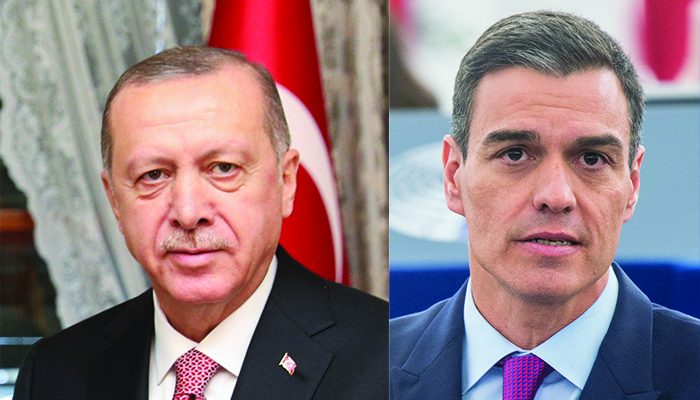
Spain is facing an unprecedented health crisis. As of Sunday, March 29, fatalities in Spain from the coronavirus pandemic (Covid-19) have reached 6,528, while the official number of infections surged to 78,797. In the midst of such a crisis, the Spanish government has requested for humanitarian aid from its NATO allies. The question to be considered now is whether Turkey, a member of the Transatlantic Alliance since 1952, will provide humanitarian aid to its NATO ally. Spain and Turkey are two countries with strong bilateral relations. The Spanish government is one of the European capitals most favourable to Turkey’s accession to the European Union (EU) – see here (PDF). The Socialist Party of the current Spanish Prime Minister Pedro Sanchez has always viewed Turkey’s accession as a way of re-enforcing the inclusive side of European integration. Spain also has defence and security interests in Turkey given that its Patriot anti-ballistic missiles are stationed in the southern Turkish city of Adana and maintains 150 Spanish troops at the Incirlik air base.
Madrid and Ankara are also linked by strong economic relations. It should be noted that in 2019, the share of Spanish exports to Turkey was estimated at $5billion. For Turkey the share of Turkish exports to Spain in 2019 was estimated at $7.6 billion. The non-conflictual relationship between Turkish and Spanish governments are also an important factor in encouraging Spanish companies to invest in Turkey. It should be noted that Spain is among the European countries that invest the most in Turkey. In 2019, Spanish investment flows to Turkey were estimated at 6.60% of all foreign direct investment inflows to Turkey.
Since the failed attempted coup of July 15, 2016, which the Turkish government blamed on Fethullah Gulen’s movement, relations between Turkey and NATO have deteriorated. Indeed, members of the Transatlantic Alliance have been particularly concerned by the unprecedented crackdown against many people of the Turkish civil society who are deemed close to the Gulen movement. The strengthening of President Recep Tayyip Erdogan’s powers since the reform of the Turkish Constitution in 2017 has also strained relations between Turkey and NATO.
NATO-Turkey relations have also been undermined by Erdogan’s aggressive diplomatic policy. This was notable when the Turkish President took the decision to sign a $2.5 billion contract with Russia in September 2017 for the supply of Russian S-400 surface-to-air missile batteries, which are incompatible with NATO’s defence system. Moreover, the Turkish leader’s three incursions into territories controlled by the Kurdish forces in Syria and his intention to push Turkey’s East Mediterranean maritime border also highlight Erdogan’s determination to jeopardise the strategic interests of his NATO allies.
While Erdogan has moved closer to his Russian counterpart Vladimir Putin, Turkey’s strategic interests have been severely affected by the interventions of Moscow and its allies in the Middle East. In Syria, Erdogan’s intention of removing the regime of Bashar al-Assad has been thwarted by the Kremlin’s military support to the Syrian President, which has enabled Assad to regain almost all the country’s key cities. Currently, the Damascus regime controls 70% of the Syrian territory.
In Libya, the maritime agreement between Erdogan and the leader of the Government of National Accord (GNA) Fayez al-Sarraj is threatened by the support of the Wagner group to Khalifa Haftar, who now controls the majority of the Libyan territory. The Wagner group is known for its close ties with the Kremlin and have been previously pivotal in defending Moscow’s interests in the Donbass and in Syria. It is therefore in Erdogan’s interest to improve relations with his NATO allies.
Health experts fear that the Covid-19 pandemic will spread across Turkey in the same way as it has in Italy if strong measures are not taken by Ankara. Currently, 131 people have died, and 1,815 new cases have emerged in Turkey. To contain the spread of the virus, Erdogan has taken the decision to close many public premises, such as cafes, theatres, schools and universities. It should also be noted that the Turkish President has taken the decision to suspend all international flights and to ban all intercity travel unless officially authorised. Turkey’s flagship carrier, Turkish Airlines has reduced its domestic flights to only 14 cities. The national carrier normally flies to 42 domestic destinations.
With the intention of avoiding a major economic collapse, the Turkish president has introduced a $15.4 billion stimulus package to help sustain businesses during the health crisis. The 6-month package is designed to reduce the financial burden on businesses especially those operating in the automotive, textile, retail, tourism and iron-steel sectors of the Turkish economy.
However, the Turkish economy remains vulnerable especially if the health crisis lingers. Ankara has very little room for manoeuvre to support the Turkish economy, let alone give aid to Spain, given that Turkey has limited financial reserves and a large budget deficit. It should be noted that the tourism sector, which employs 15 million people, could be the sector the most affected by the crisis. It is therefore essential that Erdogan focuses all his efforts in reducing the spread of the virus in Turkey or risk an economic crisis that strikes the whole Turkish society that could spark the beginning of the end of the Erdogan era.
Further Reading on E-International Relations
- Opinion – NATO’s Expansion in Northern Europe Rests on Türkiye
- Opinion – The Plain Sight Threat to NATO, Turkey, and Turanism
- Opinion – Turkish Foreign Policy after the 2023 Elections
- Opinion – How the West Can Prepare for a Post-Erdogan Era in Turkey
- Opinion – Disappointments and Expectations in Turkey
- Russia and Turkey: An Ambiguous Energy Partnership